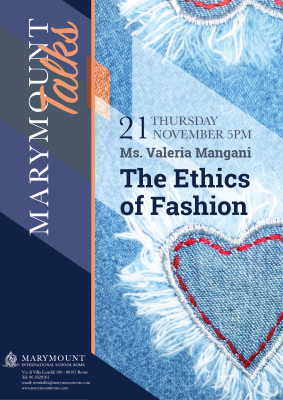Marymount talk: The Ethics of Fashion

ROME - Fashion can be said to have started as long ago as 30,000BC, when humans first used slithers of bone and ivory to create sewing needles. This revolutionary technology was a game-changer for our ancestors, allowing them to survive harsh winter climates and to project status and power through their garments.
For our chilly ice-age ancestors, sewing was a highly valued and high-status activity comparable with the later skill of metalworking. What a difference to today, when the rewards for those who make our clothes are shockingly low.
In the past, the cost of clothing made the scale of the wardrobes that we take for granted today the preserve of the wealthy.
So what has changed? In part, mechanisation of weaving and clothes manufacturing has allowed garments to be created at a greater scale and lesser cost. However, the majority of the clothes we wear need a human hand at least at some part of their creation. The bottom line is that we pay these people very little.
A shirt at a good camiceria in Rome costs from about €200. Seeing these craftspeople work, you soon realise that this is a very reasonable price for the time and skill required to create a shirt. However, we would be appalled by the idea of paying €200, or even €20, for a shirt in a High Street store.
While clothing chains can of course make savings through scaling up their operations, making standard sizes rather than tailored items, and catering to mass trends rather than individual tastes, the biggest saving they make is on the amount paid to the human manufacturers of their products.
So, the simple process of shopping for clothes poses an ethical dilemma. We have grown used to the idea that we can purchase a complete outfit - from shoes to underwear to jacket - for less than we might spend on a good meal.
And yet, despite the clothing industry’s attempts to operate behind a glossy wall of advertising images, we now know that our small saving comes at another human being’s great cost.
To help us navigate this moral maze, Marymount International School of Rome is delighted to welcome Ms Valeria Mangani, the CEO of Made In Italy Luxury and a representative to the UN for the International Women’s Alliance. Ms Mangani’s work advising fashion labels and their clients has brought her into contact with the reality of the fashion industry. She will guide us through the role that we as consumers play in holding the fashion industry to account, and how to ensure that we make moral choices when we next go shopping.
Thursday 21st November at 17.00. Followed by drinks and aperitivo. Contact mmitalks@marymountrome.com for more information and to reserve seats.


